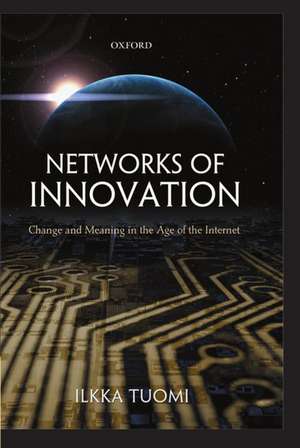Networks of Innovation: Change and Meaning in the Age of the Internet
Autor Ilkka Tuomien Limba Engleză Hardback – 7 noi 2002
| Toate formatele și edițiile | Preț | Express |
|---|---|---|
| Paperback (1) | 343.73 lei 32-37 zile | |
| OUP OXFORD – 9 feb 2006 | 343.73 lei 32-37 zile | |
| Hardback (1) | 817.71 lei 32-37 zile | |
| OUP OXFORD – 7 noi 2002 | 817.71 lei 32-37 zile |
Preț: 817.71 lei
Preț vechi: 1241.34 lei
-34% Nou
Puncte Express: 1227
Preț estimativ în valută:
156.47€ • 162.31$ • 130.48£
156.47€ • 162.31$ • 130.48£
Carte tipărită la comandă
Livrare economică 17-22 martie
Preluare comenzi: 021 569.72.76
Specificații
ISBN-13: 9780199256983
ISBN-10: 0199256985
Pagini: 264
Ilustrații: numerous figures and tables
Dimensiuni: 163 x 242 x 20 mm
Greutate: 0.53 kg
Editura: OUP OXFORD
Colecția OUP Oxford
Locul publicării:Oxford, United Kingdom
ISBN-10: 0199256985
Pagini: 264
Ilustrații: numerous figures and tables
Dimensiuni: 163 x 242 x 20 mm
Greutate: 0.53 kg
Editura: OUP OXFORD
Colecția OUP Oxford
Locul publicării:Oxford, United Kingdom
Recenzii
Surprisingly rewarding ... Food for thought for anyone who has to create new ideas for a living.
Tuomi's Networks of Innovation provides a fresh and extremely insightful analysis of how disruptive innovation actually happens, why innovation is so unpredictable and how is it intimately linked to the change of social practices. In addition he provides a brillant analysis of the innovative processes underlying the creation of both the internet and Linux sidestepping the ideology of open source while providing a highly nuanced reading of its context. This beautifully written book is a must read for any student of innovation.
Tuomi's Networks of Innovation provides a fresh and extremely insightful analysis of how disruptive innovation actually happens, why innovation is so unpredictable and how is it intimately linked to the change of social practices. In addition he provides a brillant analysis of the innovative processes underlying the creation of both the internet and Linux sidestepping the ideology of open source while providing a highly nuanced reading of its context. This beautifully written book is a must read for any student of innovation.
Notă biografică
Ilkka Tuomi worked from 1987 to 2001 at Nokia Research Center in various positions, most recently as Principal Scientist, Information Society and Knowledge Management. From June 1999 to December 2000, he was Visiting Scholar at the University of California, Berkeley. He is currently Visiting Scientist at the European Joint Research Centre, Institute for Prospective Technological Studies, Seville.















